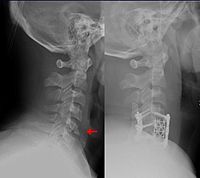
Photo from wikipedia
BACKGROUND Long-term retention of trauma procedural core-competency skills and need for re-training after a 1-day cadaver-based course remains unknown. We measured and compared technical skills for trauma core competencies at… Click to show full abstract
BACKGROUND Long-term retention of trauma procedural core-competency skills and need for re-training after a 1-day cadaver-based course remains unknown. We measured and compared technical skills for trauma core competencies at mean 14 months (38 residents), 30 months (35 practicing surgeons), and 46 months (10 experts) after training to determine if skill degradation occurs with time. Technical performance during extremity vascular exposures and lower-extremity fasciotomy in fresh cadavers measured by validated individual procedure score (IPS) was the primary outcome. STUDY DESIGN We performed a prospective study between May 2013 and September 2016. RESULTS Practicing surgeons had lower IPS and IPS component scores (p = 0.02 to 0.001) than residents (p < 0.05) and experts (p < 0.002) for vascular procedures. Frequencies of errors were no different among residents and experts. Practicing surgeons made more critical errors (p < 0.05) than experts or residents. Experts had shortest time to proximal vascular control. Fasciotomy procedural errors occurred in all participants. Cluster analysis of anatomy vs procedural steps identified tertiles of performance and wide variance (32.5% practicing surgeons, 26.5% residents vs 13% experts) for vascular procedures. Vascular control duration > 20 minutes (n = 21) and failure to decompress fasciotomy compartments were correlated with incorrect landmarks and skin incisions. Modeling found interval trauma skills experience, not time since training, was associated with lower IPS. CONCLUSIONS Practicing surgeons with low trauma skills experience since training had lower IPS and component scores (p = 0.02 to 0.001) and more errors compared with experts and residents (p < 0.05). Surgeons, including experts with low interval experience performing trauma procedures, may benefit from refreshing of correct landmarks and skin incision placement identification.
Journal Title: Journal of the American College of Surgeons
Year Published: 2018
Link to full text (if available)
Share on Social Media: Sign Up to like & get
recommendations!